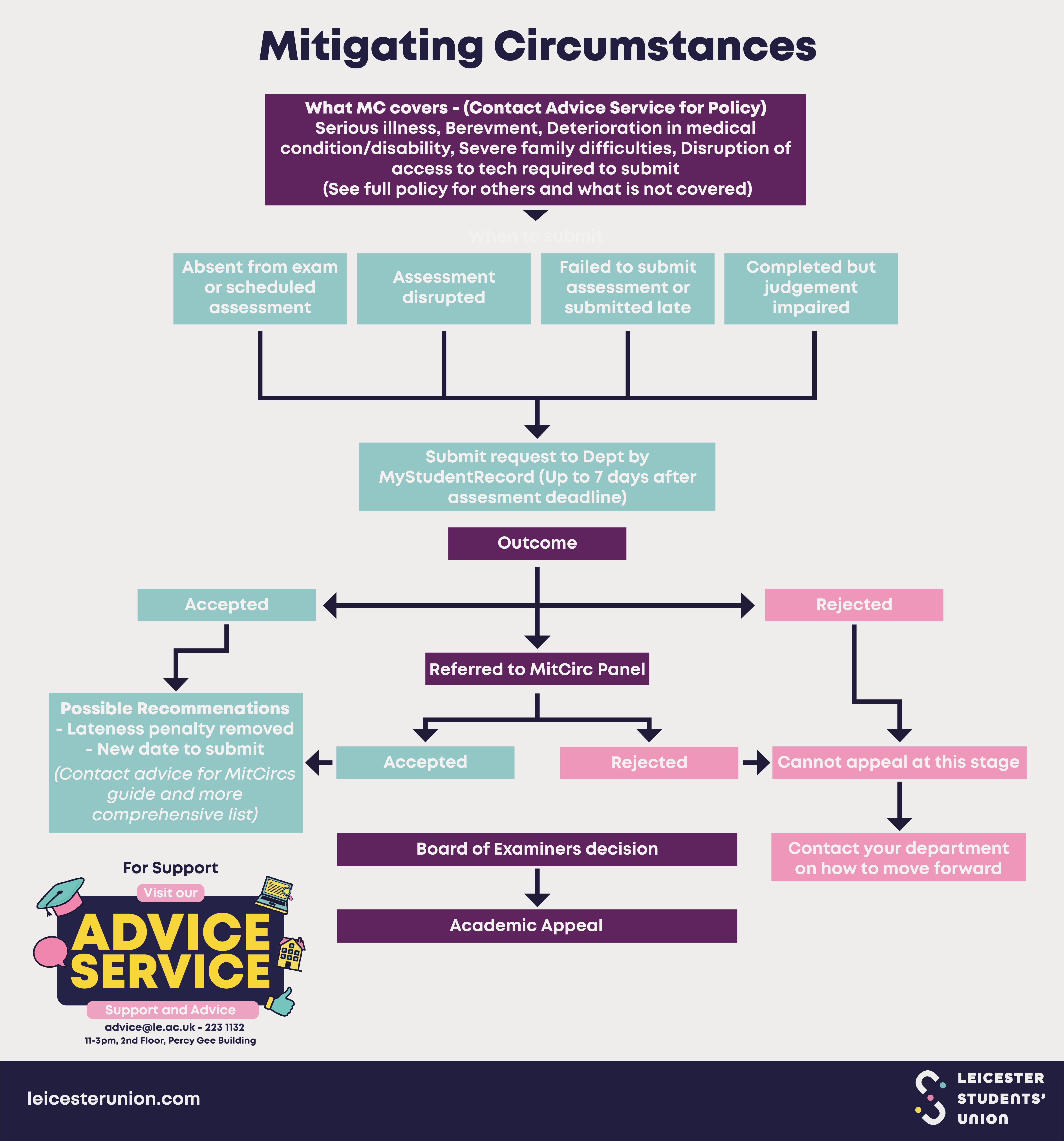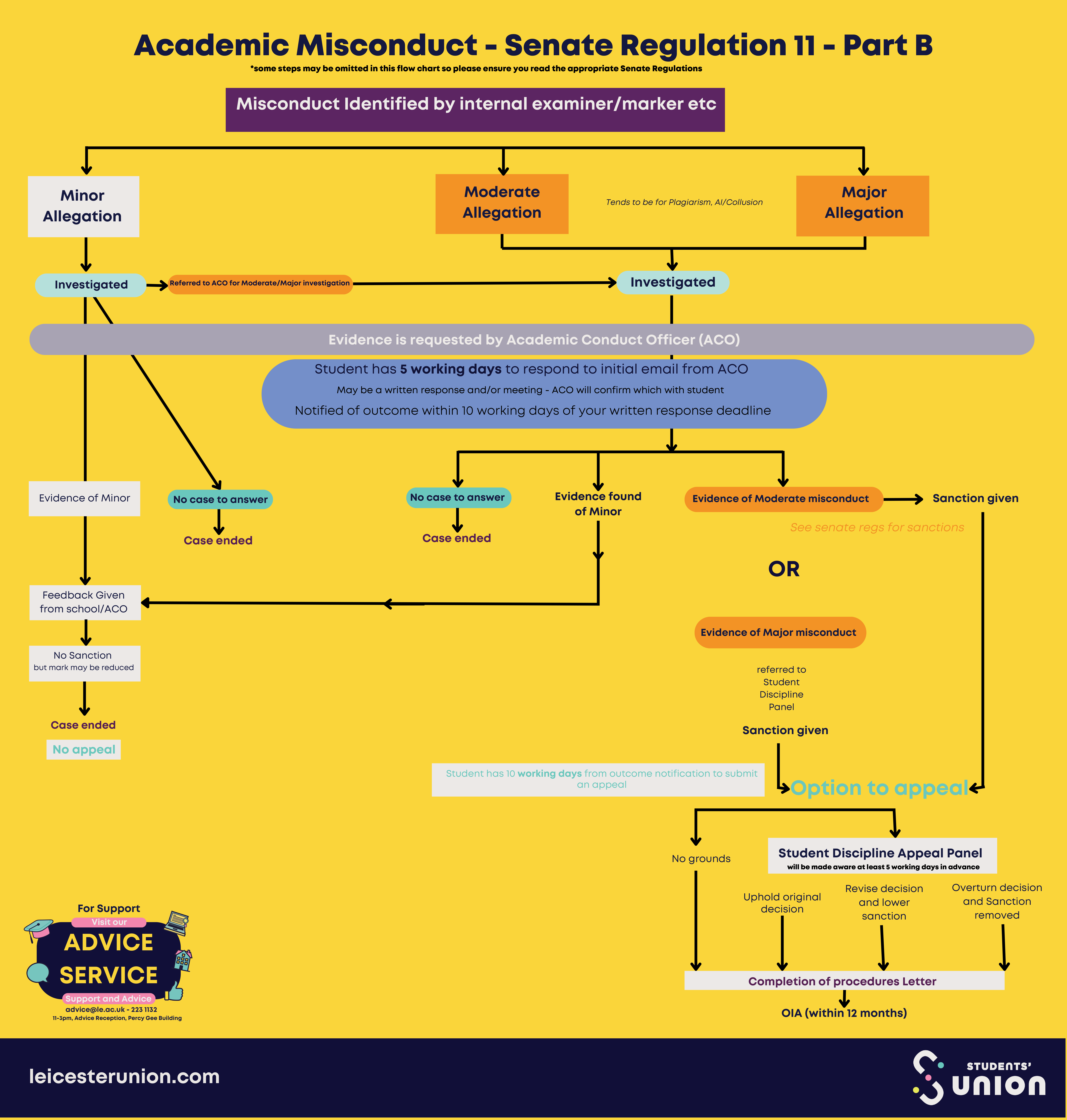 How to Guides
How to Guides
We have created a series of academic step-by-step guides to help give you the essential information you need to know.
Each guide goes through the processes from the start through to completion and also lists other useful documents and contacts. We recommend reading through the guide relevant to the issue your facing before getting in touch with us. We can discuss the processes further with you and support you through to the completion of them.
To access the step-by-step guides, and further information about each process, click on the relevant topic below.
How We Can Help
Here in the Advice Service we can help you with academic issues in the following ways:
- We can listen to your situation, and advise on the relevant process, next steps and other options.From June to September, please be aware that this is our service's busiest time and we will do our best to respond to you in a timely manner.
- We can recommend what to include in any forms or statements you might need to complete, and check through a draft for you before you submit it.
- Where necessary we can advise on what evidence to include with your submission.
- We can liaise with other services and your department on your behalf where needed, with your consent.
- If you’re asked to attend a meeting or panel hearing, we can help you prepare for this, and attend with you as moral support.
- We can signpost you to other Union, University, Student-led and Community services who can help with your circumstances.
Additional information is available on the Advice Service homepage and the Academic Advice webpage.
Academic Appeals
An academic appeal is your way of asking the University to review a decision relating to your progression or award, under certain circumstances. An appeal can be submitted once the Board of Examiners/thesis committee have met to make a decision. Such decisions include:
- Termination of your studies.
- Resit without residence year.
- Transfer to a lower award (e.g. PhD to MPhil).
- Lower award than the one you registered for (e.g. Postgraduate Diploma or Certificate, or MPhil).
To submit an appeal you must meet one or more of the following grounds, and be able to supply evidence where necessary:
- New Evidence of Significant Mitigating Circumstances.
- Evidence of Procedural Irregularity.
- Evidence of Prejudice or Bias.
Senate Regulation 10 relating to academic appeals can be found on the
Senate regulation 10 University webpage.
You can also take a look at our 2024 Step by Step Guide to Mitigating Circumstances
Additionally we also have our Step by Step Guide to Academic Appeals
Allegations of Cheating
According to the University, cheating involves “actual, or attempted deception and/or dishonest action in relation to any academic work of the University”. This can include talking to another candidate during an exam, and taking unauthorised material, paper or equipment into an exam, regardless of whether or not you use it.
Unauthorised material and equipment includes:
- Notes in any form.
- Mobile phones.
- All models of calculator not approved for an exam.
- All other electronic devices (e.g. laptops, tablets, smart watches).
If the University suspect you of cheating, you may be ask to respond to this allegation by writing to the Academic Registrar. If a penalty is applied to your exam, you then have the option to appeal this decision.
More information from the University about student discipline appeals, along with the appeal form, can be found at the Student discipline appeals University webpage.
Senate Regulation 11 relating to student conduct and discipline can be found on the Senate regulation 11 University webpage.
You can also take a look at our Step by Step Guide to Academic Misconduct Plagiarism Collusion and Cheating.docx
Attendance Monitoring
The University expects students to attend and engage with all compulsory teaching events. Compulsory and non-compulsory sessions should be made clear to you in your course handbook, but if you’re not sure of this we advise that you get in touch with your department to find out.
Attendance is monitored through the Attendance Management System, which is the system whereby you tap your card onto the scanner at the start of your taught sessions to register your attendance.
If you have periods of unauthorised absence this will show through the Attendance Management System, and the University will contact you about this. If you don’t respond there can be consequences, and if you’re a Tier 4 Sponsored student your visa could be affected. As such, it’s really important that you attend what you’re supposed to attend, report any absences, and respond to any communication from the University about attendance.
If you’re referred to an Attendance Panel as a result of non-attendance, and a penalty is applied, you can submit an appeal against this decision.
To find out more about the University’s attendance expectations, management system, and potential consequences, please see this page.
The current Policy on Student Engagement can be found here.
Additional information is available on the University Student Engagement website here.
Changing Course
If you’re not happy with your current course, you can apply to transfer to another. A transfer isn’t guaranteed as various criteria need to be met, such as entry requirements, and whether or not there is space on the course. As such, we recommend that you speak to the department you want to move into before applying, to find out whether a transfer is likely.
To apply to change course you need to complete an online application. This will then be considered by the department and you should receive a response within 7 working days.
To transfer course within the current academic year, you need to apply within the first two teaching weeks of the first semester. Any change of course applications made after this time will take effect at the start of the next academic year.
There may be visa and financial implications for changing course, so it’s important to consider these also.
To find out more about changing course, including criteria to transfer, the transfer form, information about the grounds and process, and guidance on who to talk to about the implications of changing course, you can have a look at our Step by Step Guide to Changing Course
Complaints
If you’re not satisfied with any aspect of your academic or general university experience, you can make a complaint to the University. The first stage in this process is to raise your concerns informally, ideally with the head of the relevant department, but also your personal tutor, student staff committees, our Students’ Union sabbatical officers, or us in the Advice Service.
We recommend that you make clear what you’re unhappy about and why, the impact the situation has had, and the resolution you are hoping for.
If you’re not satisfied with the response you receive at the informal stage, you can then go on to submit a formal complaint to the University. The formal complaint form, and more information about the complaints procedure, can be found at this page.
Senate Regulation 12 relating to complaints can be found here.
You can also take a look at our Step by Step Guide to Complaints.
Mitigating Circumstances
Mitigating circumstances is when you’ve experienced a serious or significant event, beyond your control, which has affected your health and personal life and stopped you from submitting an assignment or attending an exam on time.
If this applies to you, you can submit a mitigating circumstances form, with evidence, to your department within 7 calendar days of the assessment/exam deadline.
You can find our Step by Step Guide to Mitigating Circumstances and/or have a look through our flowchart below.

Non-Academic Misconduct
The University doesn’t allow certain types of behaviour, and if you act in this way your behaviour will be investigated. If misconduct is found, disciplinary action will be taken against you. Examples of misconduct are detailed in Senate Regulation 11, along with more information about the disciplinary process.
If you’re subject to disciplinary action, you may be asked to attend a meeting or panel hearing, to discuss what has happened, to present your case and answer any question.
If a penalty is applied as a result of misconduct, you have the option to appeal this decision by submitting a Student Discipline Appeal.
More information from the University about student discipline appeals, along with the appeal form, can be found at this page.
Senate Regulation 11 relating to student conduct and discipline can be found here.

Permanent Withdrawal
Withdrawing from University is a big decision, so before you take the leap you may wish to speak to your friends, family, departmental staff, or us in the Advice service, to discuss whether withdrawing is right for you, and to find out about your other options.
If you’re sure you want to withdraw for whatever reason, you can do so at any time by completing the online Withdrawal Request process. If you are an Undergraduate or Postgraduate Taught student, you should login here for MyStudentRecord to complete the process. If you are a Postgraduate Research (PGR) student, you should login to MYPGR here.
There may be visa and financial implications if you withdraw, so it’s important to consider these also.
To find out more about withdrawing from University, including information about the process, the withdrawal form, and guidance on who to talk to about the implications of withdrawing, please see here.
You can also take a look at our Step by Step Guide to Permanent Withdrawal.
Academic Misconduct – Plagiarism, Collusion and Cheating
Plagiarism is defined as “taking and using another’s thoughts and writings as one’s own”, and can occur in essays and dissertations, but also scientific experiments, diagrams, maps, fieldwork, computer programs and all other forms of independent study. Plagiarism doesn’t have to be intentional either, so it’s important that you follow the academic expectations of your course, and ensure that you are referencing properly.
If the University suspect plagiarism in your work, you may be asked to respond to this allegation by writing to your department’s Plagiarism Officer. If a penalty is applied to your work, you then have the option to appeal this decision.
More information from the University about student discipline appeals, along with the appeal form, can be found at this page.
Senate Regulation 11 relating to student conduct and discipline can be found here.
You can also take a look at our Step by Step Guide to Academic Misconduct Plagiarism, Collusion & Cheating and/or have a look through our flowchart below.

Student pregnancy, maternity, paternity and adoption
Becoming pregnant or caring for a very young child should not prevent you from succeeding in your studies. The University has a policy in place that aims to provide a more flexible approach to the University’s Senate Regulations. You are not required to inform anyone at the University if you are pregnant; however, by doing so, it allows them to either support you or refer you to the team that can.
We have created a guide on the policy, which you can access here. If you have any questions or you're not sure who to speak to, please don't hesitate to get in touch.
Temporary Suspension of Studies
If you’re not currently able to continue with your studies for financial, medical, personal, or other reasons, it may be possible to temporarily suspend your studies for up to 12 months, putting your course on hold. The suspension period counts towards your maximum period of registration.
Before deciding to suspend your studies you may wish to speak to your friends, family, departmental staff, or us in the Advice service, to discuss whether it’s right for you, and to find out about your other options.
If you’re sure you want to suspend your studies for whatever reason, you can do so at any time by completing the online Suspension Request process. If you are an Undergraduate or Postgraduate Taught student, you should login here for MyStudentRecord to complete the process. If you are a Postgraduate Research (PGR) student, you should login to MYPGR here.
There may be visa and financial implications for suspending your studies, so it’s important to consider these also.
To find out more about suspension of studies, including information about the process, the suspension form, and guidance on who to talk to about the implications of suspending, please see our Step by Step Guide to Suspension of studies .
Office of the Independent Adjudicator (OIA)
This process if for students who have been unsuccessful with their appeal review or complaint in the University.
What is the OIA?
The OIA are an external, independent body who consider complaints about Higher Education providers from around England and Wales. The service is free to use and you have 12 months from the date on your Completion of Procedures letter (issued after an appeal or complaint). To submit a complaint, do be aware that it can take several months for them to consider your complaint.
It reviews complaints by students about the acts or omissions’ of a provider and decides whether they are Justified, Partly Justified or Not Justified. Before bringing a complaint to the OIA, students must normally first complete the provider’s internal processes and obtain a ‘Completion of Procedures Letter”
This is a good option for students who were not happy with the University’s decision in relation to an appeal or complaint outcome. The OIA will consider how the University dealt with your complaint or appeal and the decision that was made.
It must be noted that the OIA does not provide a further appeal to the University but rather will consider if the decision was made correctly to the regulations.
What issues do they handle?
- Academic appeals
- Extenuating circumstances
- Teaching and facilities
- Student accommodation
- Research supervision
- Welfare
- Discrimination - race, sex, disability, age, sexual orientation or religious belief
- Bullying and harassment
- Placements
- Maladministration
- Procedural irregularities
- Unfair practices
- Disciplinary matters, including plagiarism
- Fitness to practice issues
 How can the Advice Service help?
How can the Advice Service help?
If you have any questions about the how to guides, don't hesitate to get in touch.
Get in touch with the Advice Service today.
Students Consumer Rights
You can view our guide for Students' Consumer Rights here